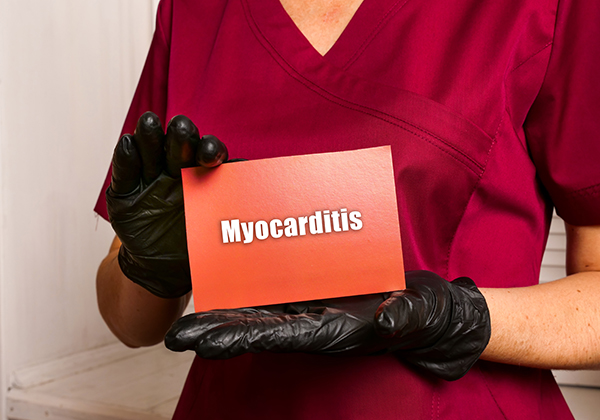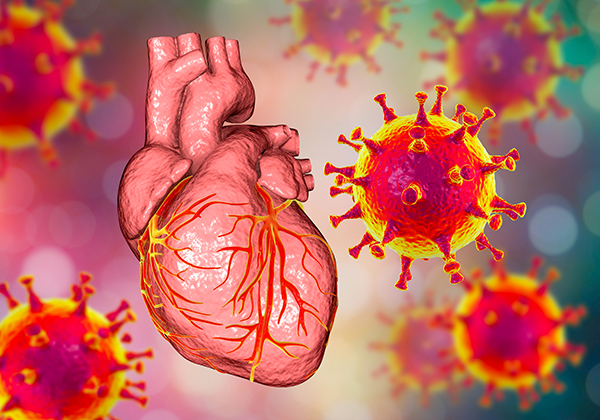 Pericarditis is a disease that causes the heart’s surrounding tissue to become inflamed. This can lead to symptoms like intense chest pain. Cases of pericarditis can range from acute to chronic, and symptoms can last anywhere from a few days to weeks or even months. Since pericarditis can reoccur, recovery focuses on managing symptoms by adhering to after-care instructions. Being diagnosed with pericarditis can be difficult to deal with – especially if you’ve never experienced heart issues before. Myocarditis Foundation is here to talk about what to expect from your pericarditis recovery to help you prepare.
Pericarditis is a disease that causes the heart’s surrounding tissue to become inflamed. This can lead to symptoms like intense chest pain. Cases of pericarditis can range from acute to chronic, and symptoms can last anywhere from a few days to weeks or even months. Since pericarditis can reoccur, recovery focuses on managing symptoms by adhering to after-care instructions. Being diagnosed with pericarditis can be difficult to deal with – especially if you’ve never experienced heart issues before. Myocarditis Foundation is here to talk about what to expect from your pericarditis recovery to help you prepare.
Adhering to Your Doctor’s Orders
Cardiologists can typically treat acute pericarditis with rest and prescribed medications. Even in chronic cases, getting plenty of rest can help to alleviate painful symptoms. In addition, if you are experiencing sharp chest pain alongside a fever, your cardiologist will prescribe over-the-counter pain relievers and anti-inflammatory medications to reduce symptoms and inflammation. It can also be beneficial to avoid strenuous activities like lifting or running. This will give your body the rest it needs to heal efficiently.
Scheduling Follow-Up Appointments
After receiving a pericarditis diagnosis, it’s important to continue seeing your cardiologist. This is especially true if you need surgery to treat chronic or worsening pericarditis. Scheduling regular cardiology appointments will allow physicians to monitor your heart’s condition closely. It will also give physicians the time they need to detect changes in your heart’s tissue, creating a treatment plan before symptoms take effect.
In the case of surgery, frequent follow-up appointments can play a role in ensuring your heart is healing at an appropriate rate. By scheduling cardiologist visits and adhering to after-care protocols, you can remain proactive about your health and avoid future pericarditis complications.
Managing Underlying Illnesses
When symptoms of pericarditis appear, physicians will look for underlying conditions that could be causing the tissue to change. Many cases of pericarditis stem from the occurrence of additional infections, diseases, or injuries, including:
- Heart attack or surgery
- Infections
- Systemic inflammatory disorders such as lupus
- Heart trauma
- Kidney failure
- Cancer
To treat pericarditis symptoms, you must control and treat underlying conditions. If left untreated, pericarditis can return or worsen to develop additional heart conditions. That’s why it’s so important for patients to follow after-care procedures. By taking the proper medications and avoiding certain activities, you can treat pericarditis as well as the disease that’s causing it.
Incorporating Lifestyle Changes
When dealing with any heart condition, it can be beneficial to make healthier lifestyle changes. While there’s no sure way to prevent pericarditis from appearing, it’s still important to manage aspects like blood pressure to promote better heart health. This can help to avoid additional complications from developing as well as control any underlying illnesses. There are many ways patients can implement healthier lifestyle choices after a pericarditis diagnosis, including:
- Quitting smoking
- Remaining active
- Eating a balanced and healthy diet
- Drinking less alcohol
- Managing stress
Find Additional Pericarditis Resources at Myocarditis Foundation
Myocarditis Foundation shares the most recent developments in myocarditis research, as well as additional resources for other heart conditions. We aim to provide the tools for patients, families, physicians, and researchers to gain knowledge of myocarditis, pericarditis, and others. By raising awareness of these conditions, we can provide patients and families with the support they need to fight this disease. To learn more about pericarditis recovery, contact Myocarditis Foundation today.
































